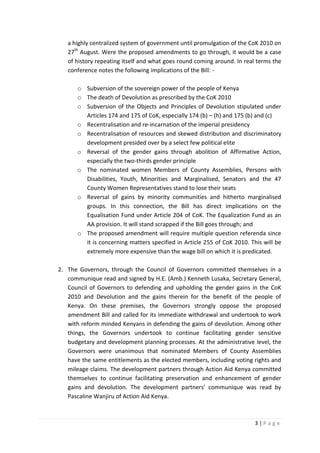This document provides a summary of the Devolution and Women Conference held from May 8-9, 2014 in Naivasha, Kenya. The main goals of the conference were to safeguard gender gains and devolution established in Kenya's 2010 constitution. Over 1,300 delegates from national and county governments, women's groups, and civil society attended to discuss threats to devolution and gender equality posed by a proposed constitutional amendment bill. Key outcomes included unanimous opposition to the bill, commitments from governors to uphold gender equality, and calls for improving civic education, women's leadership skills, and civil society engagement.





